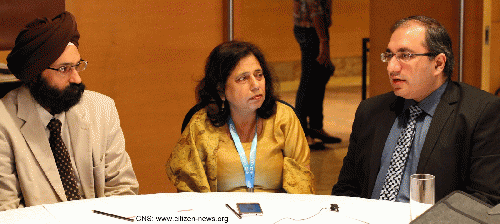
Dr Navneet Singh, PGIMER (L), Shobha Shukla, CNS (C) and Dr Marzi Mehta, surgical oncologist (R)
(Image by CNS (Citizen News Service)) Details DMCA
(CNS): Lung cancer is the most common cancer worldwide. In 2012, there were an estimated 1.8 million new lung cancer cases (13% of all cancers diagnosed), and 1.59 million deaths (19.4% of the total cancer deaths). According to the latest cancer registry data released by the Indian Council of Medical Research, 0.114 million new lung cancer cases (83,000 in males and 31,000 in females) are estimated during 2016 in India.
Over 20% cancer-deaths preventable
Anne Jones, senior tobacco control expert with the International Union Against TB and Lung Disease (The Union); former CEO of ASH Australia; and Medal of the order of Australia (OAM) awardee; said that over 20% of all cancer deaths are caused by tobacco use. Tobacco use not only dangerously elevate risk of lung cancer but also increases risk of 14 different types of cancers. Tobacco is a leading common risk factor for major non-communicable diseases (NCDs) that will kill 38 million per year with most deaths in low-and middle-income countries."
Diagnostic challenges
While early diagnosis of lung cancer helps save lives, it is beset with many challenges. TB and lung cancer have overlapping symptoms and, to some extent, similar radiological findings. So people with lung cancer, especially those living in areas far away from good healthcare facilities, often get misdiagnosed and are treated for TB. They are referred to tertiary care centres only when they do not respond to TB treatment over a period of time. This delays diagnosis and patients often present with advanced stage of lung cancer when surgery--the only modality that can lead to a cure --no longer remains an option, said Dr Navneet Singh, a pulmonologist at Postgraduate Institute of Medical Education and Research, Chandigarh, while speaking with CNS. Dr Navneet Singh cautioned that as TB is confirmed only through sputum testing, in case of sputum negative patients, rather than giving empirical anti TB treatment (ATT), it is better to investigate further through a CT scan, fine needle aspiration cytology (FNAC), biopsy or bronchoscopy to make a correct diagnosis. Some of these patients may not have TB, especially heavy smokers ,who come with symptoms of TB.
At Singh's tertiary care hospital, nearly 85% of lung cancer patients present themselves in Stage 3B and 4 of the disease at the time of diagnosis. Cure at that point of time is not possible. Dr Marzi Mehta a surgical oncologist from Mumbai shared similar sentiments that a majority of his patients present themselves in the advanced stage of the disease and only around 20-25% of them are amenable to surgical treatment. Then again, high cost and/or co-morbidities associated with surgery make some of these surgical candidates into a non surgical candidate. So it is important to pick up cases early on. "TB is a large confounding factor. So, we need to move to an era when at the slightest doubt of ATT not working, there should be an attempt to take a biopsy and prove the diagnosis one way or the other, without wasting precious time that could stand between life and death. Only then will we be able to cure stage 1 and 2 lung cancer patients with surgery and give them a good quality of life", said Mehta.
Diagnostic tools available in India
Dr Singh mentioned the different modalities available in India for diagnosis of lung cancer depending upon the location of the tumour: "A lymph node in the neck is easy to access by FNAC and/or operable by even small surgical procedures--excision biopsy. For fluid in the pleural cavity outside the lungs, a needle aspiration, thoracoscopy or thoracoscopic pleural biopsy can be done. For lesions located close to the chest wall, there is image guided ultrasound or PET guided FNAC or biopsy. For tumours in the airways bronchoscopy, bronchial brushing or bronchial biopsy must be done. EBUS (endo-bronchial ultra sound) guided needle aspiration is for mediastinal lymph nodes". There is no room for empirical treatment for lung cancer. Every case is to be diagnosed under a microscope and confirmed by the pathologist that it is truly lung cancer, emphasised Singh.
Targeted therapy and immunotherapy
(Note: You can view every article as one long page if you sign up as an Advocate Member, or higher).





